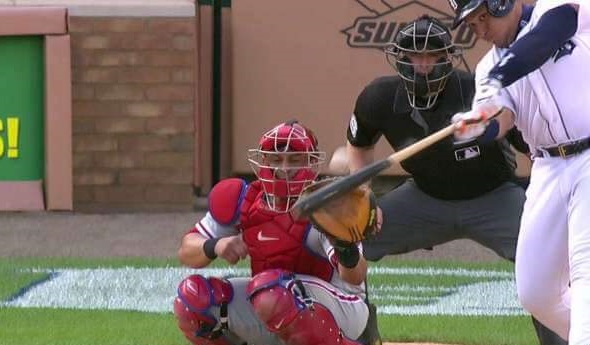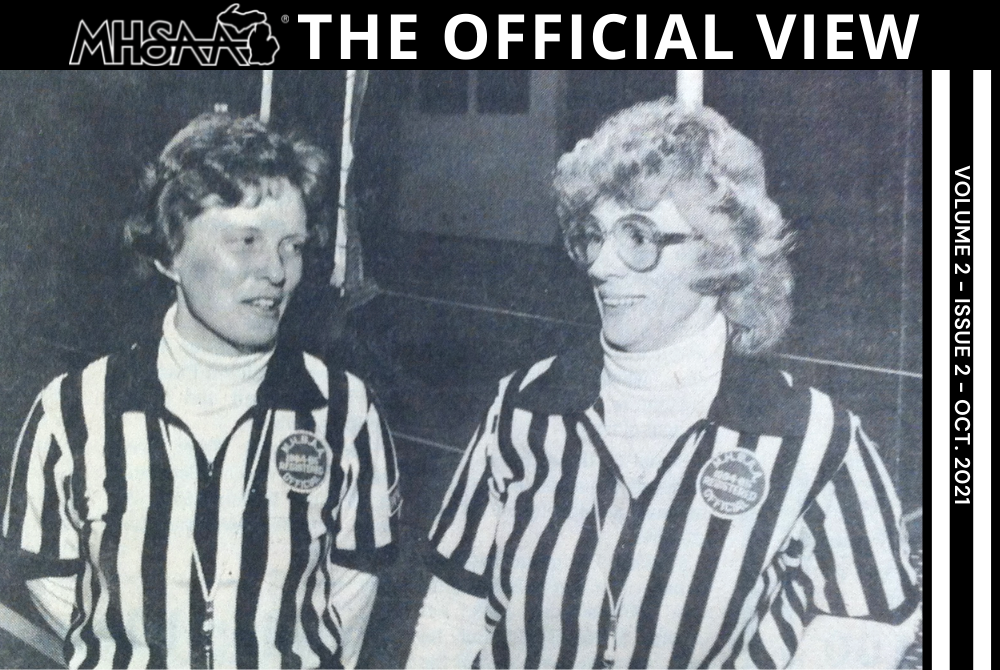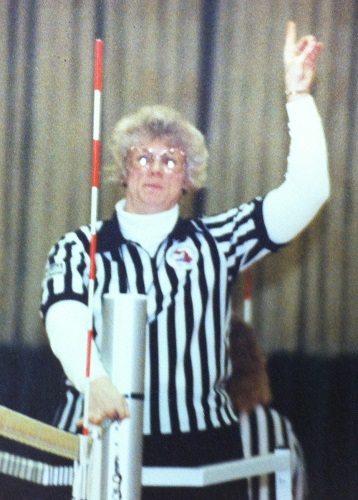
Lentz Learned from 'Legacy,' Builds Own
June 9, 2016
By Geoff Kimmerly
Second Half editor
Umpire Nic Lentz stepped onto the field April 20 at Marlins Park prior to Miami’s game against the Washington Nationals, and he was met by moments he’ll remember the rest of his life.
The game was his first at the Major League Baseball level. And if that wasn’t enough, the Howell native's parents Steve and Tammy were in the crowd – “so not only was it a special moment for me, but also making them proud walking on that field for the first time is something I’ll have for the rest of my life,” Lentz said.
“It was all very humbling. It’s hard to describe what it feels like receiving that call or stepping on that field for the first time,” Lentz wrote recently during a break in his whirlwind tour as a first-year fill-in for MLB umpires who are ill, injured or on vacation. “That being said, from a personal aspect, it took me back to years I have spent in this profession … things I have learned throughout the years both on and off the field.”
By the end of May, Lentz had traveled from Miami, to Cincinnati, then on to Baltimore, Los Angeles, Seattle, Arizona, Houston, Detroit and Toronto.
And the story of his start in officiating has been nearly as well traveled these last few weeks, with the hope his rise through the ranks – including a spring as part of the MHSAA’s Legacy Student Officials Program – might serve as an inspiration to young people considering the opportunities that come with the officiating avocation.
Lentz, 26, has risen from entry level to the largest stage in just under a decade. He began umpiring at the rec levels when he was 12; by the time he was 16, he was done playing and passionate about becoming an umpire.
A homeschooled student in the Howell area, Lentz approached then-Highlanders athletic director Doug Paige to find out how he might be able to continue growing his skills and take them to the next level.
Paige called Dan Jeffery, who currently is in his 22nd year as an officials assigner in the southeastern Lower Peninsula and works with the Kensington Lakes Activities Association and Southeastern Conference.
“Nic was 16 years old, and my son (Dan, Jr.) and I were working a game at Hartland, and I said why not come out and watch us work and we’ll talk,” Jeffery Sr. said. “Next thing you know, here’s this tall, skinny young kid waving at us.”
A decade later, Lentz took his post near first base in front of nearly 17,000 fans, the latest step in a career that’s also included stops in 10 leagues at various levels of the minor league and instructional ladder, mostly in the U.S. but also Venezuela, and MLB spring training as well.
Beginning a legacy
That first meeting with the Jefferys turned into a spot in the MHSAA Legacy Program, which pairs high school juniors and seniors interested in officiating with a registered MHSAA official. The veteran mentors the younger official, providing guidance in getting started while the pair works games together at the middle school/junior high and subvarsity levels.
 Jeffery Sr. paired Lentz with Kyle Clapper, a former player when Jeffery was part of Howell’s football staff. Lentz also continued attending games worked by Jeffery and his son (Dan Jr. now officiates at the college level), and remains in regular contact with Jeffery Sr. today. He received additional input and guidance from MHSAA assistant director Mark Uyl, who is in charge of officials for the association and worked the NCAA Division I College Baseball World Series in 2014.
Jeffery Sr. paired Lentz with Kyle Clapper, a former player when Jeffery was part of Howell’s football staff. Lentz also continued attending games worked by Jeffery and his son (Dan Jr. now officiates at the college level), and remains in regular contact with Jeffery Sr. today. He received additional input and guidance from MHSAA assistant director Mark Uyl, who is in charge of officials for the association and worked the NCAA Division I College Baseball World Series in 2014.
“(Lentz) came around and watched and showed this unbelievable interest,” Jeffery said. “He just took to it. It’s unbelievable. It’s amazing.”
“From a personal aspect, it was the next stepping-stone for me,” Lentz said of the Legacy Program. “I had been umpiring travel baseball for the past few years now, and I wanted to grow in my skills and take it to the next level. The Legacy Program seemed to be the best option. I always looked at it as the launching pad for where I am today.”
Lentz clearly has a natural talent for his profession. In January 2008, just turned 18 and recently graduated from high school, he attended the Jim Evans Academy of Professional Umpiring. After graduation there, he was put on the wait list for the Coastal Plain League, a wood bat league for college players in Virginia and North and South Carolina. He worked in that league three weeks during the summer of 2008 – and then received a call from the Arizona League, a rookie league that serves as the entry level for many minor league baseball players.
With that, Lentz began climbing his ladder as well.
Top rung and top-shelf
Lentz is in his third season in the International League, which is Triple-A – the highest minor league level for players. He’s a crew chief at that level.
He’s also shined during his MLB fill-in opportunities.
“His attention to detail; when you look at him today … his posture and his presence, you just see it,” Jeffery said. “As soon as you look at him, you just see it.
“He knows the rules, he studies really well, and mechanically he’s incredible. He not only studies the rules, but he knows where he’s supposed to be.”
 Lentz lives in Holland (as do his parents) and in 2009 joined the crew of instructors for the annual Southeast Michigan Umpire Camp, which focuses on teaching high school officiating mechanics and draws roughly 100 officials to Livonia every February. Jeffery said that two years ago, there were 40 officials younger than 20 years old.
Lentz lives in Holland (as do his parents) and in 2009 joined the crew of instructors for the annual Southeast Michigan Umpire Camp, which focuses on teaching high school officiating mechanics and draws roughly 100 officials to Livonia every February. Jeffery said that two years ago, there were 40 officials younger than 20 years old.
Jeffery calls himself the “old dude” at 68. But Lentz’ presence and current experience certainly resonate with their students.
“Nic is great with the campers and is very well-liked,” said official Bill Parker, the president and founder of the camp who also has worked in minor league baseball. “He will do anything that is asked of him. It has been a great joy watching Nic progress through the minor leagues and into the major leagues.”
“I would and do tell future and current umpires to continue to have a passion for the game. You can’t umpire any game, be it at the amateur or professional level, without that passion,” Lentz said. “So follow that passion, have fun doing it, stay humble and work hard every day. I would say that to be true for any career in life, wherever that passion may be.”
Michigan family, friends and fellow officials are cheering on that passion as they watch Lentz’ travels this summer and anticipate his move to MLB full-time in the future. Jeffery said he sees Lentz working at that highest level for decades to come – but also told his former protégé to make sure to take it all in that first game April 20, “take a deep breath, take a look around and remember where you’re at.”
And Lentz will never take for granted those who have helped him get there.
“There are so many people I have kept in touch with over the years, both before my professional career and throughout it,” Lentz said. “There are so many friendships I have built, and the support of everyone has always meant a great deal to me. And you can’t come close to putting a price tag on that.”
Click to learn more about the MHSAA Legacy Student Officials Program or Southeast Michigan Umpire Camp.
PHOTOS: (Top) Nic Lentz serves as plate umpire during an MLB game last month. (Middle) Lentz enters the field and works at third base during a game at Comerica Park. (Below) Lentz instructs umpires at the Southeast Michigan Umpire Camp. (Photos courtesy of Dan Jeffery, Sr., Bill Parker and the Lentz family.)

The Official View: Title IX – Door Opens for Female Officials
By
Brent Rice
MHSAA Assistant Director
October 29, 2021
In the 50 years since Congress passed Title IX legislation in order to create equal educational opportunities, huge strides have been made for female students to participate in athletics.
But the advancement of opportunities wasn’t just for the athletes. It also opened a door which ushered in a generation of female sports officials.
Betty Near is one of those officials whose long and distinguished career as a high school and collegiate volleyball official is a direct result of the opportunities provided through Title IX. Unlike many today who entered officiating after having played the sport, Betty didn’t have those opportunities before first climbing the ladder (literally) in 1971. She was encouraged to take up the sport by Macia Tiesenga (a nationally-ranked collegiate official) who told Betty – who had been involved in athletics recreationally – that athletes make the best officials because of their understanding of competition.
“I’m frequently asked whether I got into officiating because I played volleyball. I tell them I didn’t play because girls volleyball didn’t exist when I was in school," Near said. "I try to share the story of Title IX every chance I get, to show them that they now have opportunities to both play and officiate because of those that came before them.”
Near has spent more than 45 years as a registered MHSAA official and is still going strong. That run has included six appearances as a Finals official. She recalls how at one of those Finals, an injury to her knee created a change in mechanics for the entire state.
“When I first began officiating in the 70s, the MHSAA had the umpires (R2s today) kneel underneath the net to look at blockers," she said. "This was quite dangerous and pretty ineffective.
"Officiating at the collegiate level, I had been trained to stand at the pole and look down the net. With this background, and seeing as my knee was still hurting from an earlier injury, I decided to use this mechanic.”
 Sue Martin, the MHSAA director for volleyball at the time, approached Betty following her match. Near was certain that she was going to receive an earful. Instead, Martin asked the justification for using the mechanic, and they discussed the pros and cons of each. It was ultimately decided moving forward the umpire would take a position standing at the pole.
Sue Martin, the MHSAA director for volleyball at the time, approached Betty following her match. Near was certain that she was going to receive an earful. Instead, Martin asked the justification for using the mechanic, and they discussed the pros and cons of each. It was ultimately decided moving forward the umpire would take a position standing at the pole.
Mechanics changes aren’t the only effect Near has had on the sport. She was instrumental in the start of the West Michigan Volleyball Officials Association in 1984 and continues to help lead and grow that organization (now with more than 125 members). This has allowed her to work with the community, raising nearly $125,000 for scholarships for graduating high school seniors. And one of her biggest contributions remains her role in recruiting and mentoring new officials – especially helping to develop the next generation of female officials.
“Mentoring is a gratifying thing,” said Near, “especially when I receive emails or calls thanking me for helping them understand specific rules or situations and improving their skill sets. Watching someone I have mentored over 20 years work her way up to officiate multiple state tournaments (pleases me).”
Now officiating primarily at the college level, Betty still reserves Thursdays during the season to officiate MHSAA contests. She does this for the purpose of staying connected to high school students and officials and to build on the growth of female registered officials, though she also recognizes that challenges remain for female officials advancing through the system.
One of the natural barriers that apply to women more often than men is that women who begin families sometimes find difficulties continuing to officiate with their other responsibilities. While home lives can be difficult to navigate (for both women and men), officiating school sports provides a flexible alternative to stay active, remain involved in athletics, give back to the community, develop camaraderie and earn some extra cash.
Another hurdle that Near identifies for female officials, unfortunately, is a continuation of the “good ol' boy network.” She is reminded of a not-so-distant-past example when she and another female official had been selected to officiate the Regional round of the MHSAA Tournament; and even though both were well-established collegiate officials the host athletic director insisted that less-experienced male officials work as the R1 and R2 and the women work as line judges because the men would have better control of the tough matchup.
Of course, that kind of mindset isn’t based in fact, and many of the MHSAA’s best officials in all sports are women. Especially in girls sports, it is important that the student athletes see officials who represent them; but the MHSAA seeks female officials in all sports, including those dominated by male participants. This year will once again include a female officiating in the MHSAA Football Finals. Female officials also have worked Finals in baseball, boys basketball, ice hockey and wrestling.
The door that was opened for women and girls with the passing of Title IX a half-century ago only provides the opportunity. Capitalizing still requires stepping through the door to take full advantage of the opportunities provided. Near wants to encourage anyone to join the avocation of officiating, but especially young women.
“My hook is that the officiating is fun, and it is an activity that can be an avocation that can pay (in many ways) throughout their lifetimes," she said.
It’s Official!
Postseason Assignments: Officials assignments for fall sports tournaments have been released. Congratulations to all selected to officiate this year.
Speaking of tournament assignments, a change will be made this year that allows basketball officials to submit their availability to work together as a crew. Crews can be set for the boys and girls tournaments separately. The hope is that this will encourage more officials to seek postseason consideration, knowing they can choose with whom they will officiate. Eligible individuals not included with a crew will be assigned a crew by MHSAA staff.
For all winter sports officials, make sure to complete all requirements for postseason consideration. Please remember that officials in basketball, competitive cheer, gymnastics, ice hockey and wrestling must opt-in to the tournament by indicating their tournament availability dates HERE. All additional requirements such as completion of tournament exams and submission of regular-season schedule also remain in place.
Officials Review Committee: The Officials Review Committee, consisting of school administrators, officials and assigners from around the state, convened in early October to discuss issues and concerns involving officiating. A number of proposals were made to the MHSAA Representative Council. You can find these and other discussion items by reviewing the minutes HERE.
Know Your Rules
SOCCER A player (#7) is injured and must leave the field. His team elects to play short-handed. If #7 heals up, when can he return to the field? What if they wish to replace him with #12?
RULING If #7 comes back into the game, he only needs to wait until the next stoppage of play. If he will be replaced by #12 though, #12 can enter the game only at the next legal substitution opportunity.
It’s Your Call
REVIEW Last month’s play involved a suspect block by a defensive player (found here). The block by B17 is correctly flagged for an illegal block below the waist. While not widely known by spectators, blocks below the waist (except for linemen immediately at the snap) are illegal for players on both sides of the ball. In this case, since the block was by the defense, the penalty is enforced 15 yards from the end of the run.
VOLLEYBALL Officiating ball handling is the topic of this month’s "It’s Your Call." This rally ends following the pass of a back-row player. What’s the call?

